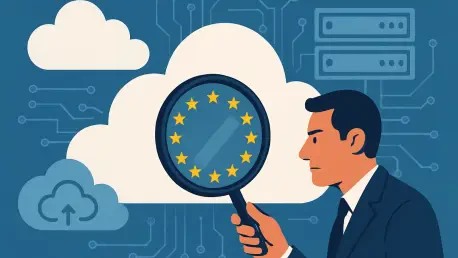Imagine a world where a single glitch in a cloud computing system can halt entire industries, disrupt digital services, and expose the fragility of modern business ecosystems, as became starkly evident during a recent outage at Amazon Web Services (AWS) that left countless companies scrambling to recover for hours. Such incidents have intensified the European Union’s scrutiny of dominant cloud providers like AWS and Microsoft Azure, as their role in the digital economy grows ever more critical. The European Commission is now evaluating whether these tech giants should face stricter regulations under the Digital Markets Act (DMA), a framework aimed at curbing the market power of large technology firms. This push for oversight reflects broader concerns about dependency on a few key players, whose influence extends from business operations to cutting-edge fields like artificial intelligence. The debate raises fundamental questions about balancing regulation with the need for innovation in a rapidly evolving sector.
Navigating Gatekeeper Status in the Cloud Sector
The European Commission’s investigation into AWS and Azure centers on whether these platforms qualify as “gatekeepers” under the DMA, a designation that would impose stringent obligations to prevent market dominance. Unlike traditional metrics that rely on user numbers, assessing cloud services requires a different lens, as their impact lies in the critical infrastructure they provide to businesses and consumers alike. Research highlights that both platforms hold exceptionally strong positions in the market, shaping how companies operate and how end users access digital services. Despite not fitting conventional criteria for gatekeeper status, their pervasive influence has prompted regulators to dig deeper into their role within the digital landscape. This evaluation underscores a broader shift in how cloud computing is perceived—not just as a service, but as a foundational element of the modern economy. The outcome of this probe could redefine responsibilities for these tech giants, aligning their cloud operations with other regulated segments of their businesses.
Balancing Oversight with Technological Progress
As the inquiry unfolds, a clear tension emerges between the European Union’s regulatory ambitions and the perspectives of AWS and Microsoft, who resist the gatekeeper label. AWS contends that the cloud computing market remains highly dynamic, offering businesses a range of options, cost efficiencies, and innovative solutions that could be hampered by overly restrictive rules. Microsoft echoes this sentiment, emphasizing the competitive nature of the European cloud sector while expressing a commitment to collaborate with the Commission for a balanced approach. Regulators, however, prioritize curbing excessive market power to safeguard digital ecosystems and ensure fair competition. The debate captures a critical moment for the industry, as the decisions made reshape how cloud services are managed across the region. Looking ahead, stakeholders must monitor how this precedent influences not only these two giants but also the wider tech landscape, potentially guiding future policies on digital resilience and market dynamics over the coming years.









